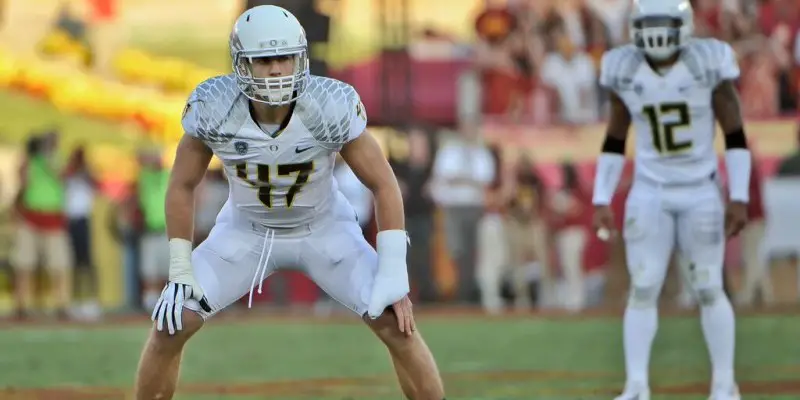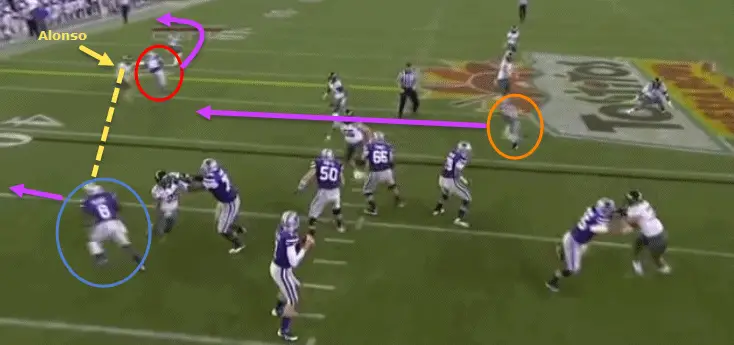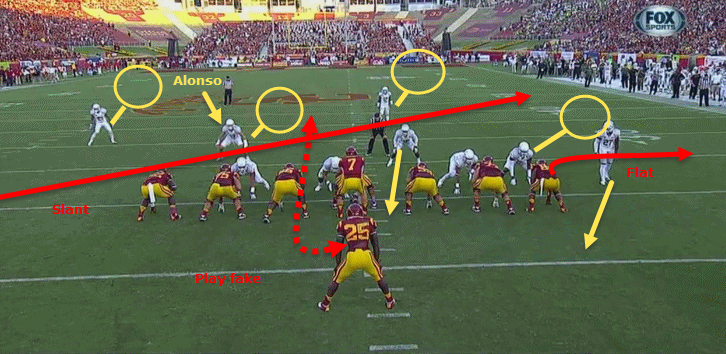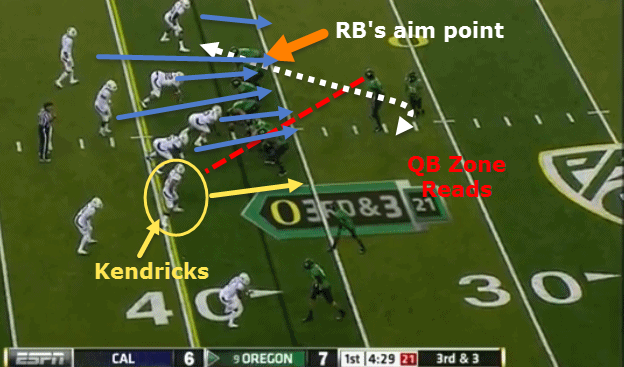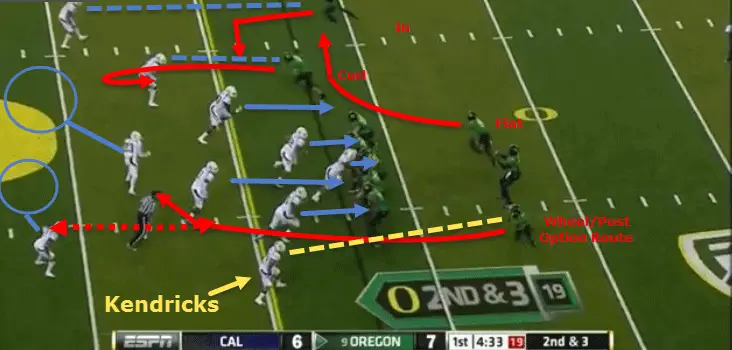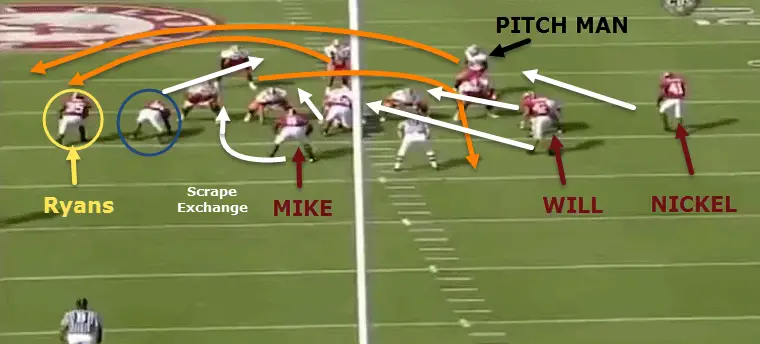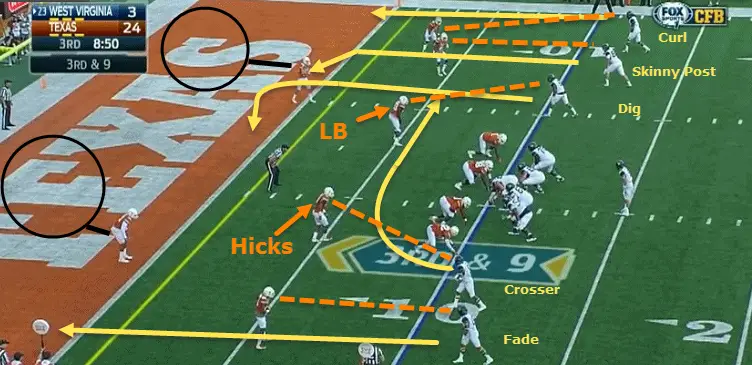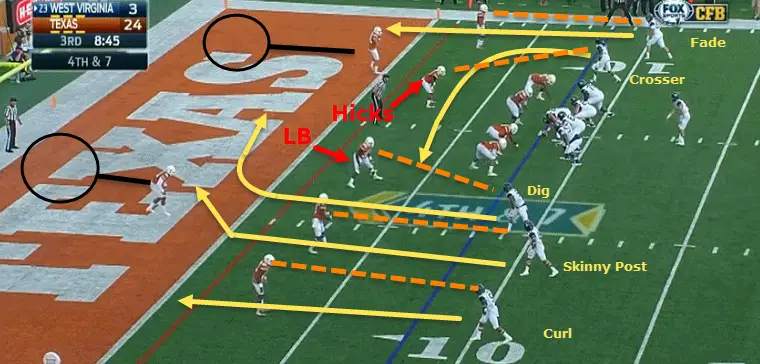What if the flap of a butterfly’s wings in Brazil began a chain reaction that set off a tornado in Texas? This notion raised by MIT meteorologist Edward Lorenz has implications for causation in physics, economics and yes, football.
The rise of the spread offense in the 21st century generated a butterfly effect on defenses. Coaches in bastions of the spread such as the Pac-12 responded to three, four and five receiver formations by using 3-4 or 3-3-5 fronts. This allowed them to easily disguise blitzes and drop eight men into coverage.
The playmakers in these schemes are inside linebackers behind the wall who must be rangy and athletic. For this reason, college football influences Chip Kelly‘s actions in the NFL and his choice of personnel at this position reflects that. Kelly’s collection of inside linebackers who played on college teams that used three-man fronts shows how a coach’s decisions on offense also shape his decisions on defense.
Kiko Alonso
Kiko Alonso became a star in the 3-4 scheme used by Kelly’s Oregon teams and the Buffalo Bills, so projecting his role in the Philadelphia Eagles scheme is not hard. His arrival is another sign that shades of Oregon will be reflected in Philadelphia.
On the play shown above, Alonso was alone on the boundary in an underneath zone assigned to him by Oregon defensive coordinator Nick Aliotti. Alonso freed his jam on a receiver (red circle) to shift his focus to the running back (blue circle) in the flat. Meanwhile, Kansas State had another receiver (orange circle) running a shallow cross.
But Alonso foiled the plan by using his peripheral vision to see the shallow cross. He accounted for three receivers and delivered a big hit all in one play.
A common tactic among West Coast offensive play callers is to exploit zone coverage by sending a slot receiver on a slant into an inside linebacker’s zone. In the play shown above, Alonso took the underneath zone over the middle. USC used play-action in hopes of getting Alonso out of position.
Alonso does not sell out for the play-fake and keeps up with the receiver. The result: an interception. This play was just one example of Alonso’s knack for creating turnovers. He had four interceptions in both his senior college season and rookie NFL season. Given Kelly’s past success in using Alonso, expect the big plays to continue.
Mychal Kendricks
Alonso should join Kendricks, another former Pac-12 playmaker, in the middle of the Eagles defense this season. After stints as an outside and inside linebacker in Cal’s 3-4, Kendricks won the 2011 Pac-12 Defensive Player of the Year honors. His performance against his future coach’s Oregon Ducks illustrated how effective he could be against spread concepts.
On 3rd-and-3 (shown above), Kelly called his bread-and-butter play — the Inside Zone Read — in hopes that the six blockers and quarterback’s zone read would neutralize seven defenders in the box. Cal defensive coordinator Clancy Pendergast gave Kendricks the simple assignment of keeping outside containment to prevent the quarterback from running free for a big gain.
Cal’s defenders were each assigned a single gap and collectively shut down the running lanes on the playside. Kendricks kept his eyes in the backfield and smoothly adjusted his body when he saw the running back cut back towards him.
Kelly loves to send running backs on wheel routes (shown above) against outside linebackers, knowing this is usually a speed mismatch in his favor. The play design would normally be masterful, but it failed to account for Kendricks’s unique talent.
Judging from how running back LaMichael James looked back to quarterback Darron Thomas, it appeared that Kelly incorporated an option route. James used a terrific head-fake on Kendricks and used the option route to get open. But Kendricks quickly recovered and forced an incompletion. Kendricks might not have Kelly’s ideal height, but the Eagles would lose a playmaker who fits their scheme if he leaves in free agency next offseason.
DeMeco Ryans
Ryans has been Kendricks’s partner in crime in the middle of the Eagles defense since 2012 when Kelly’s predecessor Andy Reid acquired them. Though Ryans gained an impressive reputation from his experience with the Houston Texans, his college career is equally telling.
In the early stages of the spread evolution, new Florida head coach Urban Meyer and his team ranked fifth before a crushing 31-3 defeat against Alabama in 2005. Defensive coordinator Joe Kines deployed his 3-3-5 defense and triumphed due to Ryans, his athletic strong-side LB (SAM).
Kines countered the renowned triple option (shown above) components of Meyer’s spread with assignment football. The one-gap play design used by Kines used here depends on players who are disciplined to stick to their assignments.
Ryans trusted the defensive back to do his job, so he maintained outside containment by pursuing the quarterback. The triple option stopped dead because Ryans stuck to his assignment.
Ryans also showed sound instincts against the spread passing attack in Alabama. The Tide showed Cover 3 on this play (shown above), which assigned three linebackers including Ryans with underneath zones over the middle.
The quarterback thought the slot receiver’s speed would provide a mismatch on the skinny post over the middle. Instead, Ryans showed tremendous range and timing to break on the route, resulting in an incompletion.
His speed has since diminished, but Mufasa‘s instincts remain strong. Kelly might value them so much that he cuts significantly into Kendricks’s playing time off the bench or even as the nominal starter.
Jordan Hicks
It is intriguing that Ryans has eerily similar measurables to Hicks, a 2015 third-round draft pick. Interestingly, Hicks’s college head coach at Texas, Charlie Strong, got his first coaching job as a graduate assistant at Florida under none other than Kines. Strong uses a playbook similar to Kines’s with frequent three-man fronts and 4-2-5 nickel packages with versatile linebackers like Hicks. In a spread era with elite receiver prospects, Hicks was a weapon against the West Virginia Air Raid attack.
On 3rd-and-9, Mountaineers head coach Dana Holgorsen called the Shallow concept (shown above) to isolate Hicks in man coverage against the slot receiver over the middle. Strong’s decision to use man coverage kept all receivers covered on paper, but asking a linebacker to go one-on-one with a slot receiver was a big risk.
Hicks immediately recognized when the receiver made his cut and he responded by jumping the route. His combination of instincts and athleticism held West Virginia to just two yards on what could have been a touchdown.
Holgorsen then decides to call the same concept from the opposite direction on fourth down (shown above).
Hicks diagnosed the play so quickly that he jumped ahead of top-ten pick Kevin White on the route and stood him up. Hicks does need to work on shedding blockers and become a better tackler before he becomes a starter for the Eagles, but Kelly rightfully admires this player’s rare intelligence.
Conclusion
The construction of this group of inside linebackers offers a better understanding of the past evolution of college football and the future evolution of the spread in the NFL. Hoping to avoid becoming a victim of his own success, Kelly added young talented linebackers like Alonso and Hicks to his past starting duo of Ryans and Kendricks. For now, a surplus of talent at inside linebacker is an excellent problem for Kelly to have.
I may be in Pennsylvania, but “Oh, how we love to learn about your beloved Ducks!”
Joe Kearns
Oregon Ducks AND Philadelphia Eagles Football Analyst for FishDuck.com
State College, Pennsylvania
Top photo by Kevin Cline
Related Articles:
Joe Kearns is a senior at the Pennsylvania State University majoring in Economics. He intends to pursue a career in the banking and financial services industries, but is also a lifelong diehard Philadelphia Eagles fan who enjoys analyzing college and pro football film as a hobby. Along with being a fan, Joe’s football knowledge comes from his days as a center, defensive tackle, and long snapper for his high school in Mt. Lebanon, Pa. Though he is a Nittany Lion, he has taken a great interest in the Oregon football team since Chip Kelly became the Eagles head coach. He loves pancakes ( and not just the breakfast food).

